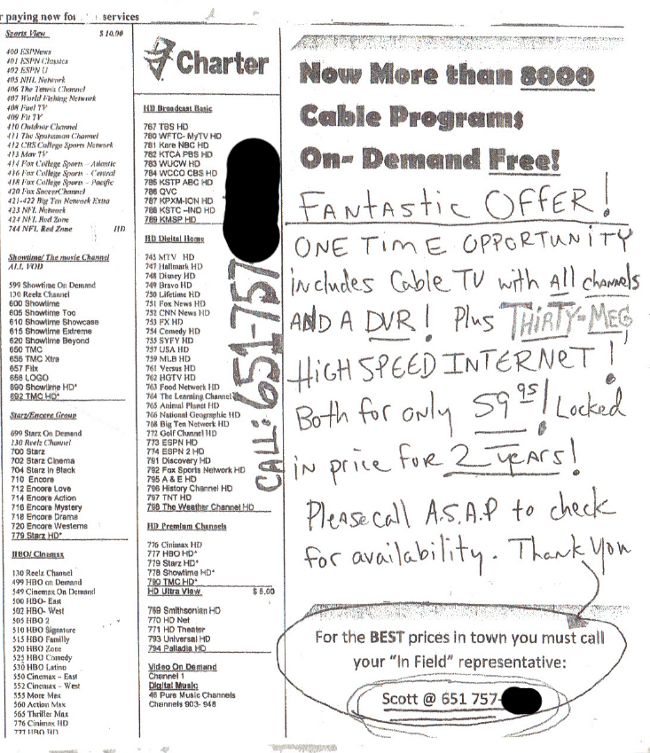[Update 10/2/2012: If you are visiting here to explore Time Warner Cable’s new $3.95 modem rental fee, please visit this article for the latest information and reviews, should you wish to purchase your own modem to replace the one you currently rent from the cable company.]
In mid-March, Time Warner Cable added a $2.50 monthly modem rental fee for all new broadband customers, but existing customers not already subject to modem fees will be exempt from paying it.
The new equipment fee applies even in areas where cable modems have always come free with the cable company’s broadband service. Until this month, customers in some areas including Rochester, N.Y., could not purchase their own cable modem equipment, but that restriction has now been dropped. In areas where modems always came free with service, some customers have told Stop the Cap! the cable operator cannot provision their new modems until after April 1st. Call your local Time Warner Cable office for exact information applying in your local area.
At $30/yr, consumers are advised it may be more affordable to purchase your own cable modem, especially if you are comfortable installing it yourself. Cable modems are at least as reliable as wireless routers, and even easier to configure.
Time Warner Cable’s current promotion page offers six months of free modem rental to new customers, with fees starting the seventh month. The cable operator supports a large number of different modems. In the northeastern United States, Time Warner will provision any of these units (you can find your area’s list of approved equipment on Time Warner’s Internet Support page):
| Vendor | Model |
DOCSIS 3.0 |
| ARRIS | TM402G | N |
| ARRIS | TM402P | N |
| ARRIS | TM502A | N |
| ARRIS | TM502G | N |
| ARRIS | TM508A | N |
| ARRIS | TM512A | N |
| ARRIS | TM602G | N |
| ARRIS | TM604G | N |
| ARRIS | TM608G | N |
| Cisco | DPC2100 | N |
| Motorola | SB5101 | N |
| Motorola | SB5101N | N |
| Motorola | SB5101U | N |
| Motorola | SB6141 | Y |
| Motorola | SBG6580 | Y |
| Motorola | SBG900 | N |
| Motorola | SBG901 | N |
| Motorola | SBG940 | N |
| Motorola | SBG941 | N |
| Motorola | SBV5121 | N |
| Motorola | SBV5222 | N |
| Motorola | SBV5322 | N |
| Netgear | CGD24G-100NAS | N |
| SA | DPC2100r1/2 | N |
| SA | DPC2203 | N |
| SA | DPC2203C2 | N |
| SA | DPX2203 | N |
| SMC | 8014CPR | N |
| SMC | 8014WG | N |
| SMC | 8014WG-SI | N |
| Thomson | DCM425 | N |
| Thomson | DCW725 | N |
| Thomson | DWG855 | N |
| Ubee (formerly Ambit) | DDC2700 | N |
| Ubee (formerly Ambit) | DDW2600 | N |
| Ubee (formerly Ambit) | U10C018 | N |
| Ubee (formerly Ambit) | U10C019 | N |
| Ubee (formerly Ambit) | U10C020 | N |
| Ubee (formerly Ambit) | U10C022 | N |
| ZyXEL | 974H | N |
| ZyXEL | 974HW | N |
Prices range from under $50 for the DOCSIS 2 Motorola Surfboard SB5101, to north of $130 for Motorola’s DOCSIS 3 SURFboard Gateway SBG6580 on Amazon.com.
 We called Time Warner customer service in Rochester for information about the modem rental vs. purchase option and learned:
We called Time Warner customer service in Rochester for information about the modem rental vs. purchase option and learned:
- The modem rental fee only applies to DOCSIS 2.0 equipment suitable for Road Runner Lite, Standard or Turbo service (1-20Mbps);
- Road Runner Extreme (30/5Mbps) and Wideband (50/5Mbps) still includes free rental of the DOCSIS 3 cable modem and the company does not currently support customer-owned DOCSIS 3 modems in this area;
- Support options for customer-owned equipment are obviously more limited, but should your cable modem fail, you can quickly rent a replacement and pick it up at your local cable store to get back online fast;
We also learned Time Warner is running promotions in many areas pitching existing Standard and Turbo Service customers six months of Road Runner Extreme for just $10 more a month for six months. If you need 50/5Mbps Wideband service, signing up for Signature Home at $199 a month is often the best value when combining phone, Internet, and cable TV service.
Because different regions handle cable modem equipment and promotions differently, it is important to call your local office prior to ordering any equipment to verify it can be provisioned and to obtain correct information about any promotions or pricing.


 Subscribe
Subscribe






